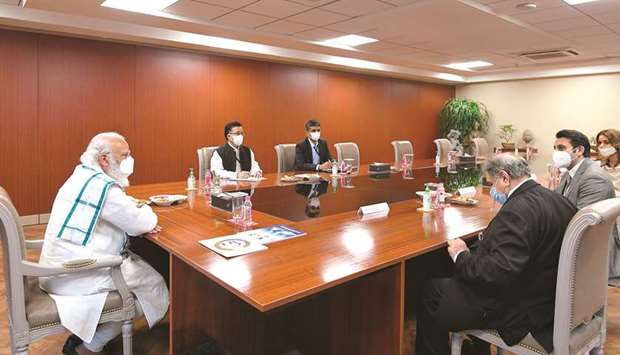The world’s largest vaccine manufacturer by volume said yesterday it would apply for an emergency licence for a coronavirus vaccine within two weeks, and that confusion over the efficacy would not delay its distribution.
Serum Institute of India chief executive Adar Ponnawala also confirmed that the Pune-based giant would be able to produce at least 100mn doses a month from early 2021 of Covishield, which was developed by AstraZeneca and Oxford University.
Poonawalla spoke after a visit to the plant by Prime Minister Narendra Modi, whose government wants 300-400mn doses by July next year as the country battles a new surge in the pandemic.
India, the second worst hit country after the United States, is expected to pass 10mn cases in early December.
AstraZeneca has said further research was needed on the vaccine after scientists raised confusion about Covishield’s efficacy.
It revealed that trials had indicated an average 70% success rate but said it jumped to 90% when an initial half-dose then a full dose was given.
It did not immediately say that the higher efficacy rate applied only to a sample of patients aged 55 or less. But AstraZeneca has insisted the results will not affect regulatory approval.
“There was a bit of confusion in the communication which will be explained in the coming days,” Poonawalla said.
“But it is not going to affect the emergency use licence in the UK and it should not affect here in India at all.”
“We are in the process of applying for an emergency use licence in the next two weeks.
“Even if the approval comes maybe two weeks later or something like that, it will not make much difference to the delivery and the quantum of doses that we will be able to distribute.”
Poonawalla said the institute was already producing 50-60mn doses a month and after January-February that will be scaled up to 100mn doses per month.
Serum Institute will concentrate first on production for India and the 150-plus countries in the Covax alliance that have agreed to work together on distributing the vaccine.
AstraZeneca and Oxford University have hailed its vaccine as being cheaper than rivals as well as easier to store and distribute because it can be handled at higher temperatures.
“This vaccine is a very good one,” said Poonawalla.
“What we found with Covishield in its global trial is there were zero hospitalisations, which means even if you do get infected you’re not going to have a severe attack and secondly even those who got the disease were not infecting others,” he said.
He also noted that the AstraZeneca vaccine, along with the vaccine from Novavax – the US vaccine developer that SII has also partnered with – offered a significant edge over the vaccine candidates of certain rivals, which need to be stored at much lower temperatures.
“Both our vaccine candidates can be stored in 2 Celsius to 8 Celsius and India has lot of storage and infrastructure for that temperature range. It has slightly less storage capacity for -20 C and almost nothing for -70 C,” said Poonawalla.
US vaccine developers Moderna and Pfizer recently announced strong efficacy results on their respective vaccine candidates, but both of their vaccines need to be stored at very low temperatures that would present challenges for many developing economies.
Moderna has said its vaccine can be stored at normal fridge temperatures of 2 to 8 degrees Celsius for 30 days and it can be stored for up to six months at -20C.
Pfizer’s experimental vaccine must be stored at -70C over longer durations.
Poonawalla urged caution about reporting on pandemic vaccines so that the public is not put off from using them.
“In a world where everyone is questioning vaccines ... we should collaborate together – media, manufacturers, the government of India and everybody to send the right messaging.”
He said coverage should “not spread any panic or negative news unnecessarily without getting down to the facts.”
“We don’t want to build doubt in the minds of people today especially in the time of a pandemic and have a situation where vaccines are available but some people are hesitant to take them because they are unsure or sceptical of the safety.”

Prime Minister Narendra Modi attends a meeting during his visit to the Serum Institute of India to review the Covid-19 coronavirus vaccine development, in Pune yesterday.


